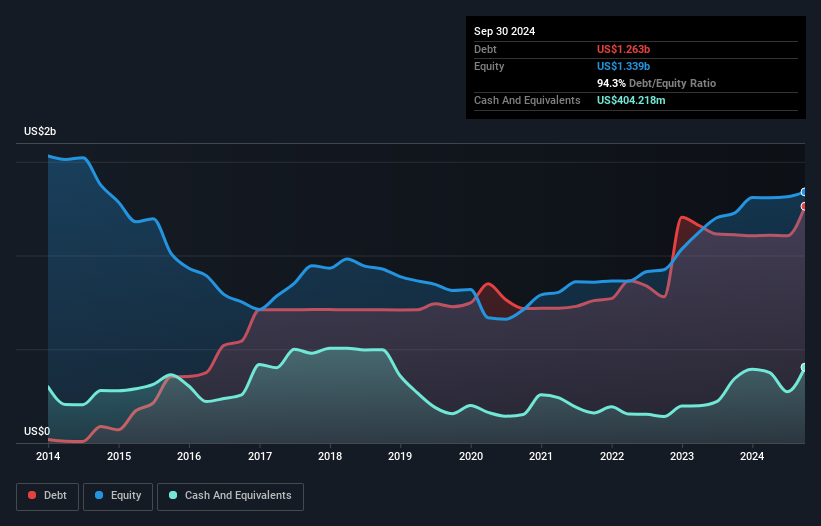- United States
- /
- Machinery
- /
- NasdaqGS:LECO
Does Lincoln Electric Holdings (NASDAQ:LECO) Have A Healthy Balance Sheet?

Warren Buffett famously said, 'Volatility is far from synonymous with risk.' So it might be obvious that you need to consider debt, when you think about how risky any given stock is, because too much debt can sink a company. Importantly, Lincoln Electric Holdings, Inc. (NASDAQ:LECO) does carry debt. But is this debt a concern to shareholders?
Why Does Debt Bring Risk?
Debt assists a business until the business has trouble paying it off, either with new capital or with free cash flow. In the worst case scenario, a company can go bankrupt if it cannot pay its creditors. However, a more common (but still painful) scenario is that it has to raise new equity capital at a low price, thus permanently diluting shareholders. Of course, plenty of companies use debt to fund growth, without any negative consequences. The first step when considering a company's debt levels is to consider its cash and debt together.
See our latest analysis for Lincoln Electric Holdings
What Is Lincoln Electric Holdings's Net Debt?
You can click the graphic below for the historical numbers, but it shows that as of September 2024 Lincoln Electric Holdings had US$1.26b of debt, an increase on US$1.11b, over one year. However, it also had US$404.2m in cash, and so its net debt is US$858.4m.

A Look At Lincoln Electric Holdings' Liabilities
Zooming in on the latest balance sheet data, we can see that Lincoln Electric Holdings had liabilities of US$951.3m due within 12 months and liabilities of US$1.37b due beyond that. Offsetting these obligations, it had cash of US$404.2m as well as receivables valued at US$574.5m due within 12 months. So its liabilities outweigh the sum of its cash and (near-term) receivables by US$1.35b.
Since publicly traded Lincoln Electric Holdings shares are worth a very impressive total of US$11.6b, it seems unlikely that this level of liabilities would be a major threat. However, we do think it is worth keeping an eye on its balance sheet strength, as it may change over time.
We measure a company's debt load relative to its earnings power by looking at its net debt divided by its earnings before interest, tax, depreciation, and amortization (EBITDA) and by calculating how easily its earnings before interest and tax (EBIT) cover its interest expense (interest cover). The advantage of this approach is that we take into account both the absolute quantum of debt (with net debt to EBITDA) and the actual interest expenses associated with that debt (with its interest cover ratio).
Lincoln Electric Holdings's net debt is only 1.1 times its EBITDA. And its EBIT easily covers its interest expense, being 17.3 times the size. So we're pretty relaxed about its super-conservative use of debt. Fortunately, Lincoln Electric Holdings grew its EBIT by 4.1% in the last year, making that debt load look even more manageable. There's no doubt that we learn most about debt from the balance sheet. But ultimately the future profitability of the business will decide if Lincoln Electric Holdings can strengthen its balance sheet over time. So if you want to see what the professionals think, you might find this free report on analyst profit forecasts to be interesting.
But our final consideration is also important, because a company cannot pay debt with paper profits; it needs cold hard cash. So we clearly need to look at whether that EBIT is leading to corresponding free cash flow. Over the most recent three years, Lincoln Electric Holdings recorded free cash flow worth 71% of its EBIT, which is around normal, given free cash flow excludes interest and tax. This cold hard cash means it can reduce its debt when it wants to.
Our View
Happily, Lincoln Electric Holdings's impressive interest cover implies it has the upper hand on its debt. And that's just the beginning of the good news since its conversion of EBIT to free cash flow is also very heartening. Looking at the bigger picture, we think Lincoln Electric Holdings's use of debt seems quite reasonable and we're not concerned about it. While debt does bring risk, when used wisely it can also bring a higher return on equity. There's no doubt that we learn most about debt from the balance sheet. But ultimately, every company can contain risks that exist outside of the balance sheet. Be aware that Lincoln Electric Holdings is showing 1 warning sign in our investment analysis , you should know about...
When all is said and done, sometimes its easier to focus on companies that don't even need debt. Readers can access a list of growth stocks with zero net debt 100% free, right now.
New: AI Stock Screener & Alerts
Our new AI Stock Screener scans the market every day to uncover opportunities.
• Dividend Powerhouses (3%+ Yield)
• Undervalued Small Caps with Insider Buying
• High growth Tech and AI Companies
Or build your own from over 50 metrics.
Have feedback on this article? Concerned about the content? Get in touch with us directly. Alternatively, email editorial-team (at) simplywallst.com.
This article by Simply Wall St is general in nature. We provide commentary based on historical data and analyst forecasts only using an unbiased methodology and our articles are not intended to be financial advice. It does not constitute a recommendation to buy or sell any stock, and does not take account of your objectives, or your financial situation. We aim to bring you long-term focused analysis driven by fundamental data. Note that our analysis may not factor in the latest price-sensitive company announcements or qualitative material. Simply Wall St has no position in any stocks mentioned.
About NasdaqGS:LECO
Lincoln Electric Holdings
Through its subsidiaries, designs, develops, manufactures, and sells welding, cutting, and brazing products in the United States and internationally.
Excellent balance sheet average dividend payer.
Similar Companies
Market Insights
Community Narratives



